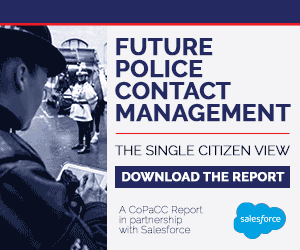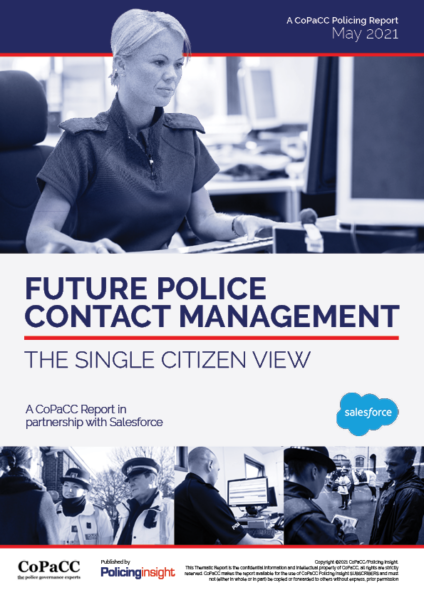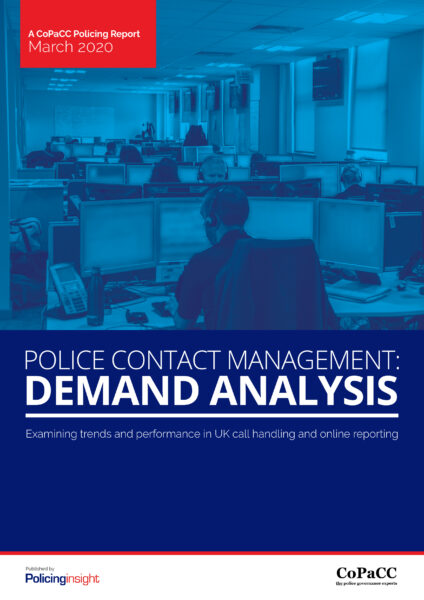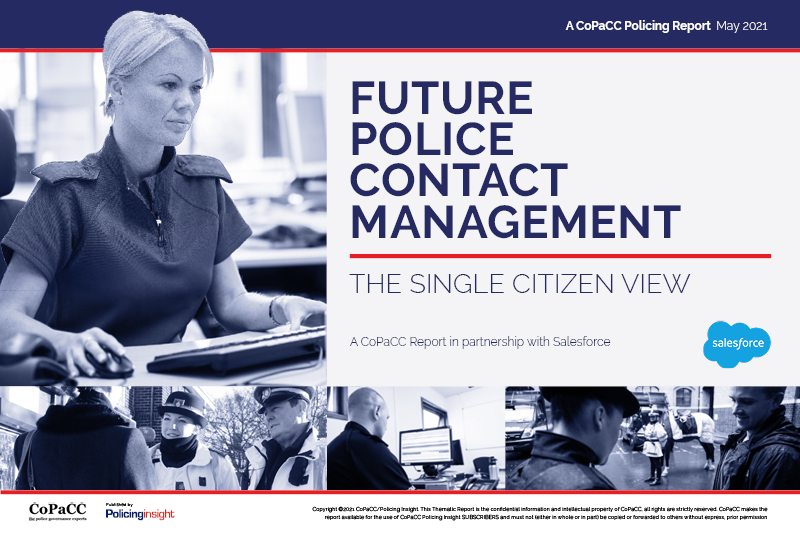The report features interviews with police contact centre managers, major stakeholders and national leads to identify the major emerging trends as well as challenges and opportunities.
The growing ability of police forces to receive public contact via digital channels has been crucial in enabling them to cope with soaring levels of Covid reporting during the pandemic, as well as the increasingly complex contact from some of society’s most vulnerable people.
That is one of the key messages from a new report published today by CoPaCC in partnership with Salesforce, which looks at the wider context of police contact management, how COVID-19 has affected both demand levels and staffing, and emerging trends and challenges around advances in technology, the public’s shift in channel choice, and how policing will cope with societal changes as lockdown is lifted.
CoPaCC’s Future Police Contact Management: The Single Citizen View report examines the police contact management landscape in the wake of last year’s HMICFRS’s A Call for help report, the publication of the NPCC’s National Contact Management Strategy (NCMS) in 2019, and 12 months of COVID-19 lockdowns and legislation.
Backed by data gathered through a series of FoI requests focusing on forces’ 999 and 101 data, digital contact, use of Single Online Home (the national digital platform) and social media, the report features interviews with police contact centre managers, major stakeholders and national leads to identify the major emerging trends as well as challenges and opportunities.
More channels, more demand
The key messages from Future Police Contact Management – an independent report commissioned by Salesforce – include:
If you think opening up more channels reduces the demand on policing, you probably also think building more lanes on the M25 reduces the traffic. If you make it easier to use and a better service, more people will use it.
PSNI ACC Alan Todd, NPCC Lead for Contact Management
- While telephony remains the main channel of choice – with around 11 million 999 calls a year and growing, and a declining 27 million 101 calls annually – digital (including online forms, webchat, social media etc) is quickly coming to the fore; some forces now receive more digital non-emergency contact than 101 calls.
- Opening up new digital channels is unlikely to reduce overall demand, but more likely to attract previously unrecognised or unknown demand.
- Single Online Home has been adopted by 27 of the 43 forces in England and Wales, and proved crucial in enabling policing to cope with the reporting of COVID-19 breaches, handling more than one million Covid contacts between March 2020 and February 2021.
- As forces prepare for the introduction of new European legislation which stipulates that the public have the right to expect an emergency response via social media channels that is comparable with telephony, the new digital target operating model and procurement framework for social media management will play a vital role in ensuring consistency.
- Although forces are advancing at pace towards increasing channel choice for the public, and improving the assessment and response to vulnerability, challenges still remain around how forces integrate the management and auditing of new contact channels, the optimum way of staffing the contact handling role (omnicompetency vs specialist staff, onsite or remote working etc), and ensuring staff wellbeing.
 Among those interviewed for the report is Police Service of Northern Ireland (PSNI) Assistant Chief Constable Alan Todd, the NPCC Lead for Contact Management, and author of the NCMS.
Among those interviewed for the report is Police Service of Northern Ireland (PSNI) Assistant Chief Constable Alan Todd, the NPCC Lead for Contact Management, and author of the NCMS.
On the issue of channel choice and changing demand, Mr Todd said: “I think initially, there was almost a simplistic expectation that if you opened up digital 101, you could shut down the telephone lines, because it would just shift, manage and reduce the demand. That was almost the attraction to some people.
“If you think opening up more channels reduces the demand on policing, you probably also think building more lanes on the M25 reduces the traffic. If you make it easier to use and a better service, more people will use it… I think the M25 analogy is probably quite accurate.”
Technological advances
Mr Todd also echoed comments from the HMICFRS supporting the increased use of artificial intelligence (AI) in answering non-emergency demand. “Mental health, vulnerability, and threat, risk and harm assessments are a much more complex environment now than when I joined policing, frankly,” said Mr Todd. “That means call times increase, the complexity increases, and the amount of information increases.
“So I think both the opportunity and the necessity drive you in the non-emergency space to more automated service delivery with AI. While not everybody is a lover of automated processes, the requirement for efficiency and effectiveness to drive that space, to keep the capability and capacity to service an ever more complex, ever higher threat and vulnerability space, becomes more important.”
The force has identified that during Covid the proportion of contact from the public relating to mental health has doubled, from one in 10 to more than one in five of the calls it receives.
AI was not the only technology advance highlighted by the report. An ongoing project by Lancashire Constabulary using voice-to-text analytics to assess previously unlogged demand (ie demand that has not required a police response, much of which had been signposted elsewhere) has used the analytics software to audit more than 400,000 audio files of calls – a task that would have taken the original eight-strong team 42 years to complete. As a result of the analysis, the force has identified that during Covid the proportion of contact from the public relating to mental health has doubled, from one in 10 to more than one in five of the calls it receives.
Other examples of the impact of technology in the report include:
- West Yorkshire Police’s advanced use of webchat, which enabled a female victim of domestic abuse – who had been badly beaten by her husband, and then locked in her kitchen without her keys or phone – to open a web browser on her smart fridge, access the force webchat, and get help.
- A new initiative being trialled by the Met Police and others to send a link to a caller’s mobile phone, which then enables call handlers to use the video camera on the phone to get the same view of a scene as the member of the public.
- New wearable technology that is being trialled by call handlers in a number of forces, which enables supervisors and managers to monitor the stress levels and wellbeing of those dealing with particularly traumatic incidents, as well as the cumulative effect of regular stressful contact.
Forward-thinking strategies
Other interviewees in the report include Chief Supt Dave Jackson, Head of the Metropolitan Police’s Contact, Command & Control; Chief Supt Richard Fisher, Head of Force Contact for West Midlands Police; Tom Donahoe, Head of the Customer Contact Centre at West Yorkshire Police; Supt Aimee Ramm, National Product Owner for Single Online Home; and Patrick Robbins, the NPCC Operations Manager for Digital and Social Media.
Writing in the report, CoPaCC’s Director of Publishing and Development, Ian Barrett, explained: “This report aims to highlight the current challenges of police contact management, and explore the forward-thinking strategies being put in place to handle this increasing multichannel demand.
“These strategies will need to incorporate a focus on the experiences and communications choices of the public – particularly those who are vulnerable – as well as the often forgotten consideration of the wellbeing of police staff, as the growing complex demand and advances in digital contact, and technologies such as live streaming, expose those staff to greater levels of pressure and the potential for increasingly traumatic contact.”
To download the CoPaCC Future Police Contact Management: The Single Citizen View Report please click here
 The report is FREE to download – just log in to your Policing Insight account or register a new free account.
The report is FREE to download – just log in to your Policing Insight account or register a new free account.
An independent CoPaCC thematic report, published in partnership with Salesforce, examining the police contact management landscape in the wake of 2020’s HMICFRS’s A Call for help report, the publication of the NPCC’s National Contact Management Strategy (NCMS) in 2019, and 12 months of COVID-19 lockdowns and legislation.
The report features FoI data focusing on forces’ 999 and 101 data, digital contact, use of Single Online Home (the national digital platform) and social media. It also includes interviews with police contact centre managers, major stakeholders and national leads to identify the major emerging trends as well as challenges and opportunities.
If you or your organisation does not have a subscription and would like to find out how to access all our reports, please contact [email protected] to enquire about our subscription options.
This report was produced in partnership with Salesforce whose single platform approach enables Police Forces to consolidate citizen touch points and ensure that all information related to a case is presented in a single view.
Police Force systems can also connect with the Salesforce platform – using any one of their integration solutions – to automate the easy exchange of data, better inform decision making at public contact, and share the right information with Officers.
See www.salesforce.com/uk/publicsector for more information
Related report
To download the CoPaCC Police Contact Management: Demand Analysis Report please click here
 The report is available for subscribers with access to an organisation-wide subscription or with a premium individual subscription.
The report is available for subscribers with access to an organisation-wide subscription or with a premium individual subscription.
Most police forces and key police and criminal justice organisations, as well as many academic and commercial organisations in the sector, have organisation-wide subscriptions providing free access to their officers and staff. Please register a free account on Policing Insight using your organisation email address – if your organisation has a subscription, your account will be automatically upgraded to Subscriber access allowing you to download the report.
If your organisation does not have a subscription, please contact [email protected] to enquire about gaining access to the reports.
CoPaCC is also able to provide one-to-one briefings on the data to organisations requiring custom analysis from the considerable valuable data generated by the research. Please contact Bernard Rix at [email protected]


